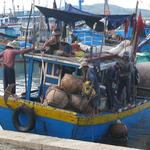Magic City, Value City: The moral geography of Suva Fiji
Fiji has had a turbulent political history of successive coups that have caused the nation to oscillate between the pursuit of ethnic nationalism and civic nationalism. Since the final coup in 2006, Fiji has suppressed ethnic nationalism that attributes national rights based on the ethnicity of indigenous peoples and has adopted a political trajectory of civic nationalism that promotes multi-culturalism and equal rights within the nation regardless of ethnicity. This article explores how indigenous Fijian (iTaukei) urban village residents continue to imbue urban space and infrastructure with ethnic value. The ethnic values they imbue in the city provide them a sense of belonging to the city, and the city belonging to them, forming an inalienable notion of ethnic citizenship in the urban context. I ethnographically detail how iTaukei urban residents imbued two spaces, an abandoned house, and a bulk clothing distribution centre, with ethnic value embodied by slogans “Magic City” and “Value City”. In this article, I argue that this ethnic project occurs within a broader moral geography whereby contested notions of how the city should operate between the civic nationalist Fijian state and ethnically nationalist iTaukei residents plays out. The Fijian state regulates this moral geography through the policing of urban space, the suppression of free speech, and the implementation of urban formalisation policies.



